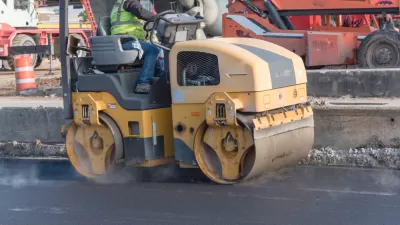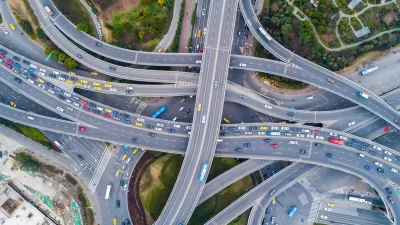A mile-and-a-half-long section of Interstate 95, which handles 80,000 vehicle trips a day, will be expanded in Virginia. The project includes a new shoulder, lighting, and noise walls.
The Virginia Department of Transportation (VDOT) recently broke ground on the I-95 Southbound Auxiliary Lane project, intended to help ease a “notorious” bottleneck on the freeway near Occoquan, Virginia.
According to an article by Neal Augenstein, VDOT estimates that southbound I-95 averages approximately 80,000 vehicles a day in the area.
“The project will convert a mile-and-a-half of the existing shoulder to a travel lane,” reports Augenstein. “The project will provide a new lane of travel, between Va. Route 123 and Prince William Parkway.”
“VDOT added that the $23.7 million project also includes a new shoulder and relocated noise walls. Crews will also replace roadway lighting, install or upgrade guardrails and build new retaining walls,” adds Augenstein.
The project is one of numerous highway widening projects underway around the country, moving ahead despite the transportation sector’s role as the largest source of greenhouse gas emissions in the country, as well as a growing body of evidence of the effects of induced demand limiting the congestion relief benefits of expanded roadways.
More details about the local political support for the project can be read at the source article below.
FULL STORY: One of the most notorious I-95 bottlenecks will soon get an extra lane

Alabama: Trump Terminates Settlements for Black Communities Harmed By Raw Sewage
Trump deemed the landmark civil rights agreement “illegal DEI and environmental justice policy.”

Planetizen Federal Action Tracker
A weekly monitor of how Trump’s orders and actions are impacting planners and planning in America.

The 120 Year Old Tiny Home Villages That Sheltered San Francisco’s Earthquake Refugees
More than a century ago, San Francisco mobilized to house thousands of residents displaced by the 1906 earthquake. Could their strategy offer a model for the present?

LA’s Tree Emergency Goes Beyond Vandalism
After a vandal destroyed dozens of downtown LA trees, Mayor Karen Bass vowed to replace them. Days later, she slashed the city’s tree budget.

Sacramento Leads Nation With Bus-Mounted Bike Lane Enforcement Cameras
The city is the first to use its bus-mounted traffic enforcement system to cite drivers who park or drive in bike lanes.

Seattle Voters Approve Social Housing Referendum
Voters approved a corporate tax to fund the city’s housing authority despite an opposition campaign funded by Amazon and Microsoft.
Urban Design for Planners 1: Software Tools
This six-course series explores essential urban design concepts using open source software and equips planners with the tools they need to participate fully in the urban design process.
Planning for Universal Design
Learn the tools for implementing Universal Design in planning regulations.
Ada County Highway District
Clanton & Associates, Inc.
Jessamine County Fiscal Court
Institute for Housing and Urban Development Studies (IHS)
City of Grandview
Harvard GSD Executive Education
Toledo-Lucas County Plan Commissions
Salt Lake City
NYU Wagner Graduate School of Public Service





























